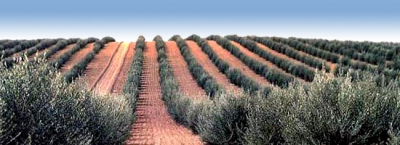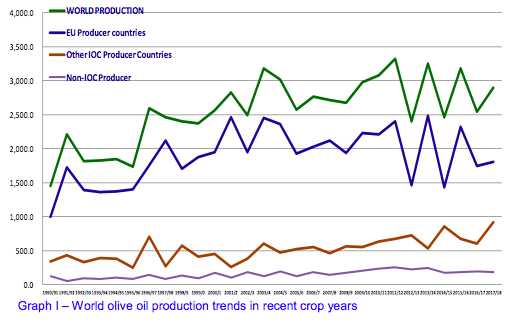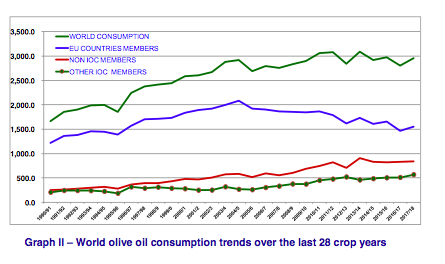
The world olive oil balance for the 2016/17 crop year opened with 549 500 t of olive oil held in stocks. World olive oil production is assessed at 2 539 000 t, down by 20% compared with the previous crop year (- 637.500 t). The figure for the aggregate olive oil production of IOC member countries stood at 2 350 500 t, accounting for 93% of the world total. EU olive oil production is assessed at 1 747 500 t, decreasing by 25% year-on-year. The individual figures show Spain in first place with 1 286 600 t, followed by Greece with 195 000 t, Italy with 182 300 t, Portugal with 69 400 t and the smaller producers (Cyprus with 6 000 t, Croatia with 5 100 t, France with 2 800 t and Slovenia with 400 t). Overall output in the rest of IOC Members fell by 10%. The leader of the group is Morocco with 110 000 t (-15%) followed by Tunisia with 100.000 t. (-29%); Algeria with 63 000 t (-23%); Argentina with 21 500 t (- 10%); Jordan with 20 000 t (-32%); Palestine with 19 500 t (-7%); Libya with 16 000 t (-11%) and Israel with 15 000 t (-17%). Production volumes in the remaining Members are on a smaller scale. Production increased in Turkey, coming in at 177 000 t (+18%); Egypt with 20 000 t (+21%); and Lebanon with 25 000 t (+9%). Graph 1 shows the trends in world production, broken down by three producer groups: EU/IOC Members, other IOC Members and non-Members.

Producción
World consumption in the 2016/17 crop year is provisionally assessed at 2 803 000 t, which is a 6% decrease compared to the previous year. The EU-28 consumed 1 463 000 t of this, for an overall decrease of 12% (-197 000 t). The countries where consumption fell are Greece (-25%), France (-17%), Italy (-14%), Spain (-7%), while the small producers (Cyprus, Croatia, Slovenia) together post an 8% increase. The consumption figures for the rest of the IOC member countries increase by approximately 2%. The most important increases are seen in Turkey (+34%), Lebanon (+11%) and Iran (+5%). The remaining countries either post decreases or the same volumes as the previous crop year. Among the non-member countries, notable increases in consumption are observed in Brazil (+19%), China (+13%), Australia (+7%) and Japan (+2%). Consumption however declined in Canada by 4% and in the United States by 2%.
According to the latest official national estimates, world olive oil production in 2017/18 is expected to increase by 14% at around 2 894 000 t. The aggregate output of IOC member countries is estimated at 2 717 000. EU countries are expected to account for 1 805 000 t of this tonnage, for a 3% year-on-year increase. Production in Spain is estimated at 1 090 500 t for a 15% decrease compared to the last crop year, it would be followed by Italy with 320 000 t (+76%); Greece with 300 000 t (+54%); and Portugal with 78 800 t (+14%). Smaller tonnages are forecast for the rest of EU producer countries. Production in the other IOC member countries is expected to see a strong year-on-year increase, up by 51%. The main increases are forecast in Turkey, at around 287 000 t (+62%), followed by Tunisia with 220 000 t (+120%); Morocco with 140 000 t (+27%), Algeria with 80 000 t (+27%); Argentina with 37 500 t (+74%); Jordan and Egypt with a production of 25 000 t, both increasing by 25%; Libya with 18 000 t (+12%); Israel with 16 000 t (+7%), while production in Lebanon will decrease by 8% at 23 000 t. The remaining countries present small production volumes.
World olive consumption for 2017/18 is estimated at 2 954 000 t, which would be a 5% increase compared to the previous crop year. Graph II shows world consumption trends in the three groups of countries: European consumer countries, IOC member countries and non- Members.

Historical time series data (1999/91–2017/18) for production, consumption, imports and exports of olive oil and table olives can be found on the following links:
To comment you have to register
If you're already registered you can click here to access your account
or click here to create a new account


Comment this news